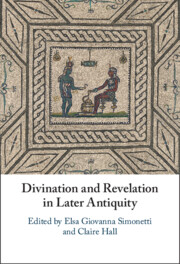Book contents
- Divination and Revelation in Later Antiquity
- Divination and Revelation in Later Antiquity
- Copyright page
- Contents
- Illustrations
- Notes on Contributors
- Acknowledgements
- Introduction
- Part I Philosophical Perspectives on Divination, Revelation, and Prophecy
- Part II Status, Role, and Functions of Human Intermediaries
- Part III Divine Transcendence and Pragmatic Purposes
- Chapter 9 Revelation and Roman Augury
- Chapter 10 ‘For Thy Kingdom Is Past Not Away, / Nor Thy Power from the Place Thereof Hurled’
- Chapter 11 ‘No Longer Does Phoebus Have a Cabin’
- Index
- References
Chapter 11 - ‘No Longer Does Phoebus Have a Cabin’
Emperor Julian and the Fall of the Temple of Apollo in Delphi
from Part III - Divine Transcendence and Pragmatic Purposes
Published online by Cambridge University Press: 19 October 2023
- Divination and Revelation in Later Antiquity
- Divination and Revelation in Later Antiquity
- Copyright page
- Contents
- Illustrations
- Notes on Contributors
- Acknowledgements
- Introduction
- Part I Philosophical Perspectives on Divination, Revelation, and Prophecy
- Part II Status, Role, and Functions of Human Intermediaries
- Part III Divine Transcendence and Pragmatic Purposes
- Chapter 9 Revelation and Roman Augury
- Chapter 10 ‘For Thy Kingdom Is Past Not Away, / Nor Thy Power from the Place Thereof Hurled’
- Chapter 11 ‘No Longer Does Phoebus Have a Cabin’
- Index
- References
Summary
This paper focuses on three famous hexameters allegedly uttered by Apollo in Delphi for Emperor Julian by means of the emperor’s physician Oribasius. Since the nineteenth century, this text, in which Apollo announces the destruction of his temple and the silence of the oracle, has been the subject of numerous interpretations. Some scholars regard it as a genuine oracle produced in Delphi and intended for the pagan Emperor Julian while he was in Antioch (362–3). Others argue that it is a Christian forgery and piece of anti-pagan propaganda written shortly after Julian’s death. In this chapter, I first discuss the literary context of this oracle’s quotation in the Artemii Passio, an anonymous and fictitious seventh-century hagiographical work. I argue that we cannot date the text to the fourth century, because its attribution to the lost Church History of Philostorgius appears to be spurious and is not grounded. Second, I analyse the anonymous hagiographer’s construction of this episode and compare it to similar late Byzantine pseudo-oracles about the fate of pagan temples in order to provide a new interpretation of this prophecy.
- Type
- Chapter
- Information
- Divination and Revelation in Later Antiquity , pp. 208 - 221Publisher: Cambridge University PressPrint publication year: 2023
References
- 1
- Cited by

